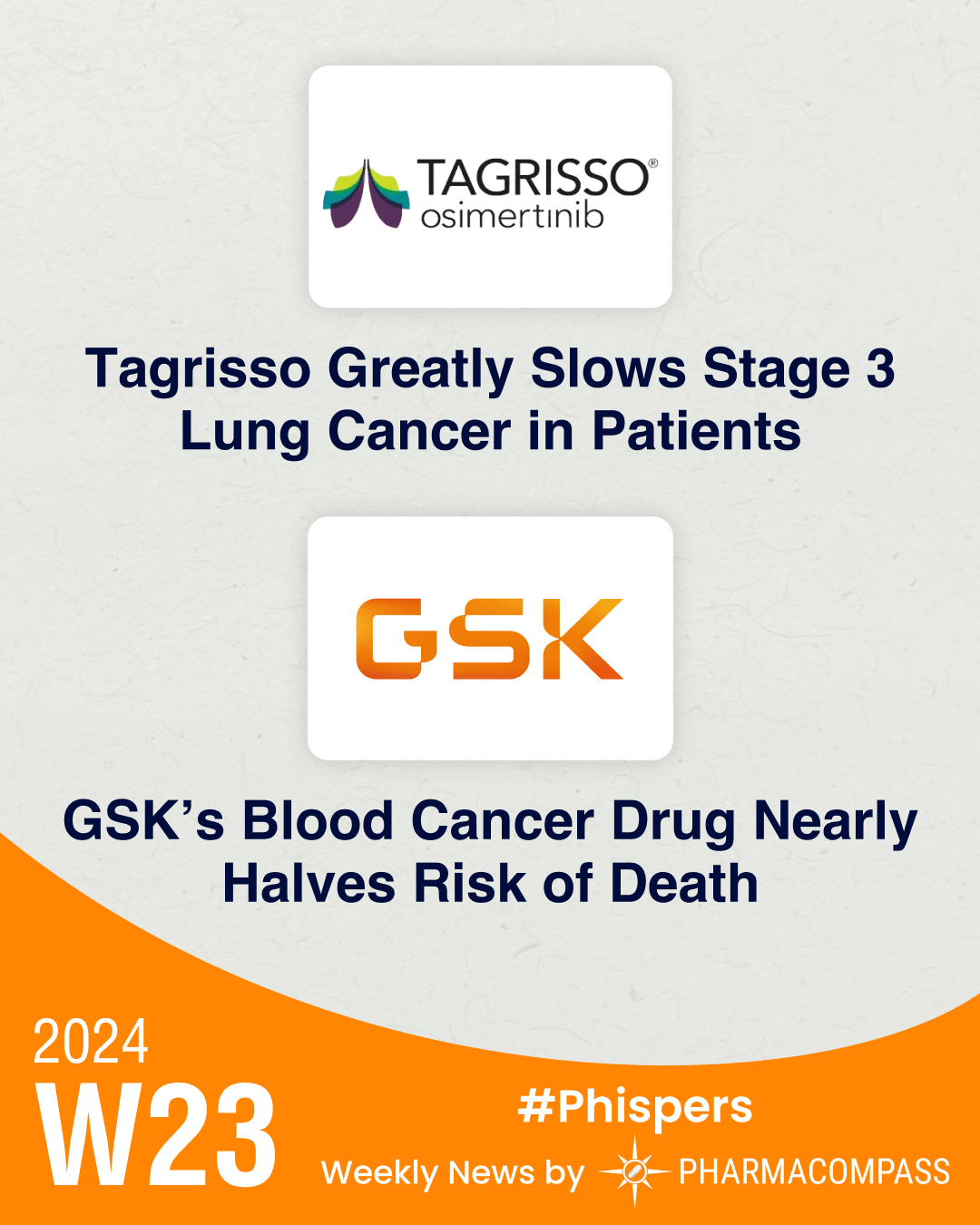
By PharmaCompass
2024-06-06
Impressions: 961 (Article) || 1 (Video)
This week saw the American Society of Clinical Oncology (ASCO) annual meeting in Chicago where cancer researchers presented detailed findings from hundreds of clinical trials. Central to AstraZeneca’s ambitious plan to clock US$ 80 billion in annual revenue by 2030 is its cancer drugs. Trial results for Astra’s top-selling cancer drug Tagrisso as a maintenance therapy for certain lung cancer patients and for Enhertu in breast cancer suggested they could become the new standard of care.
Meanwhile, in the treatment of the currently incurable multiple myeloma (MM), GSK's Blenrep cut the risk of disease progression or death by almost half compared to standard-of-care treatments. Sanofi boasted a first-in-class win wherein Sarclisa as a combination therapy bested standard of care in newly diagnosed MM patients.
Among the data presented at ASCO, the world’s first personalized mRNA cancer vaccine for skin cancer has excited doctors after Moderna’s mRNA-4157 (V940) plus Merck’s Keytruda halved the risk of patients dying or the disease returning. Also, Moderna’s mRESVIA has become the first mRNA RSV vaccine approved by the US Food and Drug Administration (FDA).
In what came as a disappointment for advocates of psychedelic drugs for medical use, an FDA advisory panel has voted against the first MDMA treatment for post-traumatic stress disorder (PTSD) amid concerns about flawed trials.
ASCO: Astra’s late-stage Tagrisso data in lung cancer trial gets standing ovation
Data presented at ASCO showed that AstraZeneca’s Tagrisso (osimertinib) reduced the risk of disease progression or death by a whopping 84 percent in patients whose non-small cell lung cancer (NSCLC) had an EGFR mutation and couldn’t be surgically removed. Patients on Tagrisso saw an average of 39.1 months without disease progression compared to 5.6 months in the placebo group. The late-stage results were met with a standing ovation as experts said the treatment could become the standard of care for one of the leading causes of cancer death.
Imfinzi boosts lung cancer survival: The British-Swedish drugmaker said its human monoclonal antibody Imfinzi (durvalumab) is the first and only immunotherapy to show survival benefit in limited-stage small cell lung cancer (LS-SCLC), in a global late-stage trial. Imfinzi reduced the risk of death by 27 percent versus the placebo. At the three-year mark, 57 percent of Imfinzi treated patients were alive.
Breast cancer drug Enhertu shows strong results: AstraZeneca and Daiichi Sankyo’s Enhertu delayed the progression of breast cancer by about five months in women with low levels of HER2 protein whose cancer progressed following endocrine therapy. The findings could significantly increase the range of breast cancer patients that may benefit from the antibody-drug-conjugate (ADC).
GSK’s blood cancer drug eyes US comeback after cutting risk of death by almost half in phase 3 study
GSK's MM therapy Blenrep (belantamab mafodotin) has cut the risk of disease progression or death by almost half compared to standard-of-care treatments, data touted at ASCO showed. After a year, 71 percent of patients on Blenrep, in combination with pomalidomide plus dexamethasone (PomDex), were alive and saw no worsening of their disease compared to 51 percent of patients on Takeda’s Velcade (bortezomib) plus PomDex. The once-failed ADC was pulled from the lucrative US market in 2022, but the results could signal a comeback for Blenrep.
Sanofi says Sarclisa combo beat standard of care in phase 3: Sanofi's Sarclisa, combined with standard care, achieved a 40 percent reduction in the risk of progression or death compared to standard care alone in newly diagnosed multiple myeloma patients ineligible for a stem cell transplant. Takeda’s Velcade (bortezomib), BMS’ Revlimid (lenalidomide) and the steroid dexamethasone (VRd) is the current standard of care. Sarclisa is the first anti-CD38 monoclonal antibody to significantly improve PFS in combination with VRd, the French drugmaker said.
Moderna’s mRESVIA becomes first mRNA RSV vaccine approved by FDA
FDA approved Moderna’s mRESVIA, an mRNA respiratory syncytial virus (RSV) vaccine, to protect adults aged 60 years and older from lower respiratory tract disease caused by RSV infection. This is the first messenger RNA-based (mRNA) vaccine not for Covid to be approved in the US and is seen as a much-needed second product for the Boston-based biotech.
Moderna’s mRNA cancer vaccine plus Keytruda cuts risk of death by nearly half: Moderna and Merck presented three-year data on their investigational vaccine for patients with the most deadly form of skin cancer, in combination with the blockbuster Keytruda (pembrolizumab). A mid-stage trial showed that after 2.5 years, 75 percent of melanoma patients on the combination had recurrence-free survival, compared with 55.6 percent on Keytruda alone. Furthermore, at 34.9 months, mRNA-4157 (V940) in combination with Keytruda reduced the risk of recurrence or death by 49 percent compared to Keytruda alone in these patients
Summit, Akeso's antibody bests Keytruda in head-to-head phase 3 trial for NSCLC: Ivonescimab met its primary endpoint of significantly improving PFS over the world’s bestselling drug Keytruda. Ivonescimab received marketing authorization in China in May and is licensed to Summit Therapeutics in the US, Canada, Europe, and Japan. Keytruda is a PD-1 inhibitor, while ivonescimab is a bispecific antibody targeting both PD-1 and vascular endothelial growth factor (VEGF) proteins.
FDA panel votes against first MDMA treatment for PTSD amid concerns about flawed trials
An FDA advisory panel has voted 10 against one, saying the benefits of using the party drug MDMA to treat PTSD do not outweigh the risks. Data submitted by Lykos Therapeutics was reportedly marred by inconsistencies, poor study design and allegations of misconduct. While FDA is not required to follow the panel’s advice, a final decision is expected by August 11. There hasn't been a new treatment for PTSD in over two decades and this marked the first time FDA advisers considered a Schedule I psychedelic for medical use.
FDA's Operation Warp Speed for rare disease treatments gets first candidates
Selected companies have joined the FDA's Operation Warp Speed for rare disease treatments, known as the Support for Clinical Trials Advancing Rare disease Therapeutics (START) Pilot Program. This initiative facilitates closer collaboration between early-stage participants and FDA staff. Grace Science's GS-100 for NGLY1 deficiency, Denali's DNL126 for MPS IIIA (Sanfilippo syndrome type A), Larimar's nomlabofusp for Friedreich’s ataxia, and Neurogene's NGN-401 for Rett syndrome were among the chosen therapies.
The PharmaCompass Newsletter – Sign Up, Stay Ahead
Feedback, help us to improve. Click here
Image Credit : Phisper Infographic by PharmaCompass license under CC BY 2.0
“ The article is based on the information available in public and which the author believes to be true. The author is not disseminating any information, which the author believes or knows, is confidential or in conflict with the privacy of any person. The views expressed or information supplied through this article is mere opinion and observation of the author. The author does not intend to defame, insult or, cause loss or damage to anyone, in any manner, through this article.”







